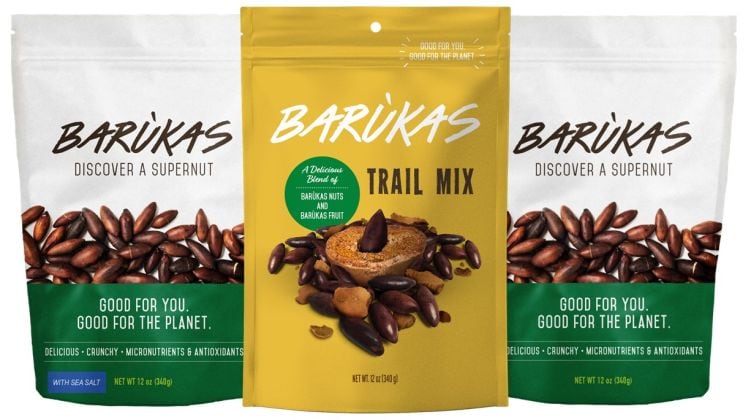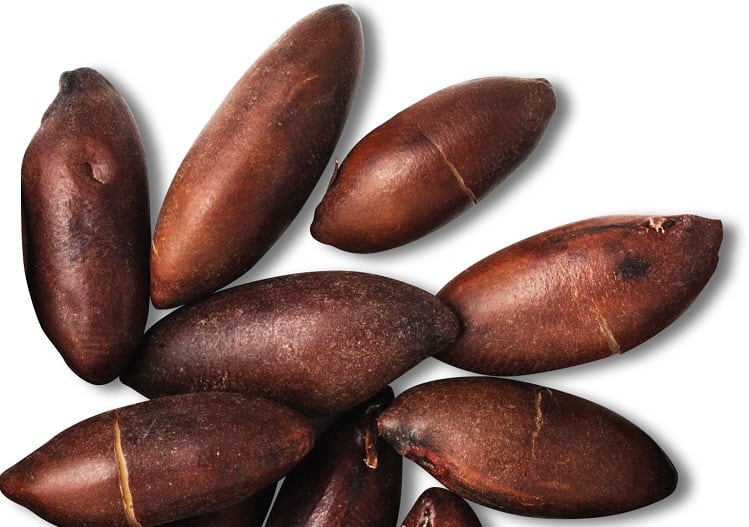Established in 2017 by the ex-COO of fitness firm Beachbody (Seth Tuckerman) and the company's protein shake creator (Darin Olien), Barùkas Inc recently launched its line of trademarked baru nut products online and into a range of natural retailers in the US, primarily across California.
The roasted baru nuts – low in calories but high in protein, fiber, magnesium and antioxidants – come in plain, sea salt and trail mix 12oz varieties and retail online for $13.95. There's also a travel size 1.5oz bag available. Barùkas Brazil, the company's collection and processing subsidiary, also exports larger, tailored quantities to customers looking for wholesale supply.
As the company moves into its third baru nut collection season and upscales expansion in the US, co-founder Seth Tuckerman said the ultimate goal was to get stocked in a wide range of outlets and markets.
“What we'd really like to see is Barùkas penetrating different channels in different countries, so there's a broad base to support the business. We'd love to have an airline serving them in first class; a coffee chain that serves them in all their coffee shops; we'd love to have a manufacturer who makes a granola or adds them to a cereal; or a confection company that's making some delicious chocolate item from them,” Tuckerman told FoodNavigator-USA.
The aim, he said, was to split business between its own branded snack products and distribution of trademarked baru nuts to manufacturers across the globe, particularly Europe and Asia-Pacific.
However, Tuckerman said it was important Barùkas remained concentrated in its expansion, to reach consumers willing to pay a premium to buoy its ecological business model.
'If you want to save ecology, you've got to do it in a way that makes people prosperous'
Baru nuts grow wild on Baruzeiro trees [Dipteryx alata Vog.] in the Cerrado – a vast, tropical Savannah biome covering around 500m acres of Brazil and parts of Paraguay and Bolivia, much of which has been devastated by deforestation. Baruzeiro trees bear around 4,000 fruits and shed these just once a year, between August and September, and Barùkas had worked with some 10-20,000 locals to forage these, so far.
The collection window is small, and fruits must be collected before seasonal rains arrive and the fruits germinate, leaving just 8-12 weeks for wild harvesting each year.
Barùkas Brazil got off the ground with money from a charitable trust set up by Tuckerman in his retirement, and pledges to buy everything foraged for 50 centavos (USD 0.13) per kilo of fruit, providing the collectors leave one-third of what has dropped to nature. The fruit collected by local cooperatives is then either stored or processed at two of its Brazilian plants ahead of exportation.
“My belief is, if you want to save ecology, you've got to do it in a way that makes people prosperous because there's only so far that good wishes will go,” Tuckerman said.
“...It's exactly what the trust was set up to do; to do something crazy that no reasonable investor would do. You're in a remote area; in a country that's known for political instability; currency instability – what kind of business person would go there and buy what [the foragers] bring, without knowing what you would do with it?”

'When I tasted it, it was like an epiphany...'
When Barùkas initially pledged to buy all fruits foraged, some years ago, Tuckerman said the company hadn't even worked out how to extract the nuts on a mass scale, let alone garner market interest.
Although co-founder Darin Olien had no doubt about eventual market interest. “I was always intimately engaged because of the nutrient density, micronutrients, antioxidants, the rareness this nut has, and then when I tasted it, it was like an epiphany.”
Olien, a self-coined superfood hunter and creator of the Beachbody Shakeology line, said the nuts were delicious. “I've worked with many botanicals where you have to formulate around taste, tannins, textures – things that often give it its medicinal properties –whereas this, there were no barriers.”
Driving and supporting 'conscious consumerism'
Barùkas is now focused on advancing its processing capabilities, adding an additional two processing sites this year and finalizing the latest model of its specially-designed cracking machine, and will also expand its harvesting collectives.
Olien said work to formulate new products with the nuts would continue, including butters, milks and pestos, as well as a strong focus on strengthening local relationships in Brazil.
“This is a wild product that is amassing a huge amount of land space, so the intimacy of the collectives and people are 100% necessary for us to have the business. This relationship is very important – for them to be happy and this to be sustainable.
“...I want to show that conscious consumerism is real and it's no less valuable to have profit and to protect the environment and support an indigenous culture.”
'I want to show that conscious consumerism is real'
The long-term plan for Barùkas, the co-founders said, is to extensively re-plant Baruzeiro trees throughout the Cerrado region – a total of 20 million eventually. The company currently pledged to re-plant one tree for every 5lb of nuts sold.
Tuckerman said the sooner this goal could be reached, the better. “What I'd like to see, in the next three years, is there's enough of a market for Barùkas that farmers are convinced that there's no number of trees they could plant that is too many.
“...The best thing for the tree planting is to have consumers who are quite dedicated to the product; it's one of the reasons we went online first – to get consumers that understand the benefits, are happy to pay a reasonable price for them and will be very loyal.”

